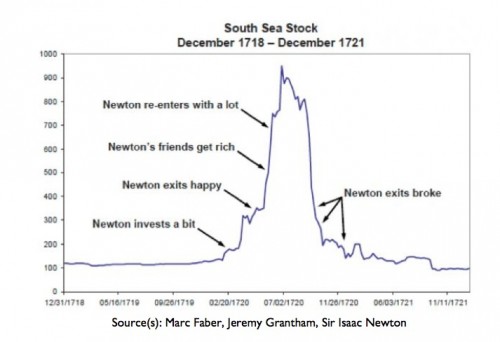Are you smarter than Isaac Newton? If not, do not think you can escape bubbles…

Sir Isaac Newton was probably one of the most intelligent persons that have ever lived with an estimated IQ of 190.
But even the founder of calculus was not immune to foolish human behaviour.

Briefly, the South Sea Company was formed in 1711 and was promised a monopoly of all trade to the Spanish colonies in exchange for taking over and consolidating the national debt raised by the war of Spanish Succession (1701-1714). However, the trade turned out to be unprofitable, the debt was unmanageable, and the company gave out directly false statements concerning their finances. Eventually, the bubble popped.
Newton lost £20,000 (allegedly most of his life savings).
As you can see from the graph Newton initially made a pretty good investment, yielding 100%. However, he got emotional when the South Sea Company skyrocketed, and his friends got rich(er) and was sucked back in the bubble at almost the peak.
He supposedly said that: He knew how to predict the motions of the cosmos, but he could not calculate the madness of the people. Or his own emotions perhaps?
The catastrophic lack of judgement is sometimes used by advocates of regulation of financial markets.
If not even Newton could keep his emotions in check, then we must protect people against their own stupidity.
But is this a valid argument?
The regulators themselves are heavily invested in the idea of fiat currencies and fractional reserve banking, which many very intelligent people think is a bubble itself. Or perhaps a scheme (or scam) is a better word. Bubbles are in my definition unregulated (not structural).
At this time in Britain there were a lot of stock bubbles.
In 1720 the Bubble Act was formed requiring all joint-stock companies to receive a royal charter. The South Sea Company actually got its charter, meaning it was officially not a bubble.
Throughout history we see that the regulators make huge mistakes.
Thus, who are going to regulate the regulators?
For me a bubble is a positive word: It is a sign of creative destruction, that moves the world forward. Bitcoin could perhaps be the biggest bubble in the world right now, but it is not a scheme nor a scam.
Even though Newton had a catastrophic loss in the South Sea Company, he was a successful investor in the ensuing years. Perhaps, smart people learn from their mistakes?
Perhaps, some sort of failure is paramount for learning, e.g. fail fast and move on.
If Bitcoin went to zero (hypothetically), I wiIl loose some money, but I am only myself to blame.
I do not want any government backed agency tell me what to with my money.
Also, people in high positions are in my opinion often there because of good social skills, and a lot dumber and naive than most people think. Many CEOs in big companies I have talked to do not even know what fractional reserve banking is.
Thus, the regulators are the last people on earth I would ask for advice.
I would probably have asked… Newton for advice: The former Master of the Royal Mint.
In 1699 Isaac Newton became Master of the Royal Mint; a post which he occupied until his death in 1727.
Newton was behind the gold standard, and this year the Royal Mint has celebrated the 375th anniversary of his birth buy making this beautiful coin Royal Mint
Hi @janusface, First off - Many congratulations on writing this beautiful piece of writing. I've followed you couple of weeks ago, but this is your first post that I read from start till end or the post made me read it till end. You must be a story-writer because your writing style is story-telling. It connects the readers and coveys message effortlessly. Amazing. I've met some amazing writers at Steemit and let me tell you that you're a nice addition to the list.
The post is excellent. This passage made me laugh out loudly while sitting in a room all alone:
Here, you gave the failure a new meaning:
Absolutely great post but it's equally saddening to see very low earnings at it. The post is for sure, undervalued.
Anyway, keep sharing, caring, educating and inspiring the world as it badly needs people like you end pain, suffering, insecurities and all other negativity. Stay awesome @janusface.
Steem On!
Thanks for your inspiring comment! Glad you liked my post:) Steem On!
damm that was really interesting to know about it serious some cool thing i came to know today
hey@janusface, I greet you and give great value to your piece of original writing here. Surely, this post is a bubble in on it's own!
I like the example (especially the graphics), but it is a fallacy. I seriously doubt that someone like George Soros is smarter than Newton, but knowing how to invest is not a question of intelligence, that depends on many other factors. It's not all about intelligence, not why Newton is smarter than LeBron James means he'll play basketball better.
To know if something is a bubble or not, you must know if it is really useful. That is, if bitcoin is really useful (as it is) and has a large market (it has it) then no matter it drops to zero, because sooner or later it will rise again.
If the BTC rises tomorrow to a million dollars, it is most likely an inflated price because there is not so much current demand for the BTC. I do not think that the BTC is as such a bubble, sometimes it has a pair, it would have to have a good eye to note what they are, but in its bases the BTC is really useful.
Sure, raw intelligence is not the only predictor of success as an investor. However, most successful investors are highly intelligent, e.g. Soros.
I just find it fascinating that Newton was sucked into the bubble again. Back in 1700s the stock market was very immature and difficult to analyse (hence all the bubbles), somewhat like cryptocurrencies today. So, perhaps Newton would have been a stock investors a la Soros in today's informed market place.
Newton vs. LeBron and basketball: I think you comparing apples to pears here. Not relevant for your argument. A bubble has nothing to do with the usefulness of the underlying asset. Quite contrary, most bubbles are in very useful 'securities'. I do not know what blockchains are in the world of finance (equity, option?). They are so revolutionary and disruptive, and thus highly prone to bubbles. I do not think (in fact I know) that anyone can accurately predict the intrinsic value of Bitcoin, and I do not know if we are in a bubble, because bubbles are only identified retrospectively. There are very good arguments for why Bitcoin should be worth much less, and there are very good arguments for why Bitcoin should be worth 1 million dollars. I have no problem seeing BTC a lot higher than today's price, but I do not count on it. I have BTC, but I do not live in a tent and moved all my fiat into BTC. I try to not be so emotional invested into any investment. One argument why BTC could go a lot higher is that is looks very antifragile and gains from disorder. And it does not seem correlated with any other asset class (for obvious reasons). Thus, from a portfolio perspective, some BTC could decrease risk overall. When the super rich understand this, then BTC could skyrocket. Only time will tell.
Bubbles are generated when there is an overdemand of a product, therefore, the BTC is going to be very volatile and will constantly have microbubbles as long as it continues to have such a low value. Since many people with low and medium capital can speculate with their value to get a couple of slices.
The imminent danger to the BTC is the States and a negative reaction from them.
But far from that I believe that the BTC has indeed a value and a utility that justifies its demand, especially in the countries of the third world and / or with authoritarian government (case China), so that in the long run it will end up rising in value .
Of course this is all my opinion, and of course, I may be wrong, but that's my way of looking at things.
Interesting read, never new this part of newton's life :)
As for bubbles..everything is a bubble, the thing is nobody knows when they will burst! It can be in the next fork, or in 2050 ;)
This is an excellant post, so true that the best lessons learned are from failed lessons. Glad that you habe an intrest in silver, as in my opinion is, that silver will be a life saver and a wealth protector. Resteemed and followed buddy, thanks, stop by #steemsilvergold we would love for you to think about joining our tag. Thanks again
Well as much as he was such a genius, he was also human, and he made mistakes too
@janusface - Sir, if Sir Isaac Newton get caught by a bubble, we have no way to escape from it.... I fear to say, but if more BTC hardforks happen, then I fear BTC will become a bubble also.... Nice you decided to share this article Sir.... Therefore, I wish to ReSteem your post.
+W+ [UpVoted & ReSteemed]
Excellent article, I really liked your comparison of the bubble taken from Isaac Newton and in confirmation of your words I agree with you that Bitcoin is now certainly too swollen, but this is not fraud! Thank you @janusface
I totally agree with you on some points @janusface, bitcoin might just be a bubble for now but it may create a stronger community after the crash to raise from ashes and build a stronger base.
Plus the fact that Isaac Newton was smart is proven by the simple fact that he finished his life as someone wealthy, learning from his mistakes. There are not mistakes, only lessons.
Thanks for your article, definitely upvoted and followed :)